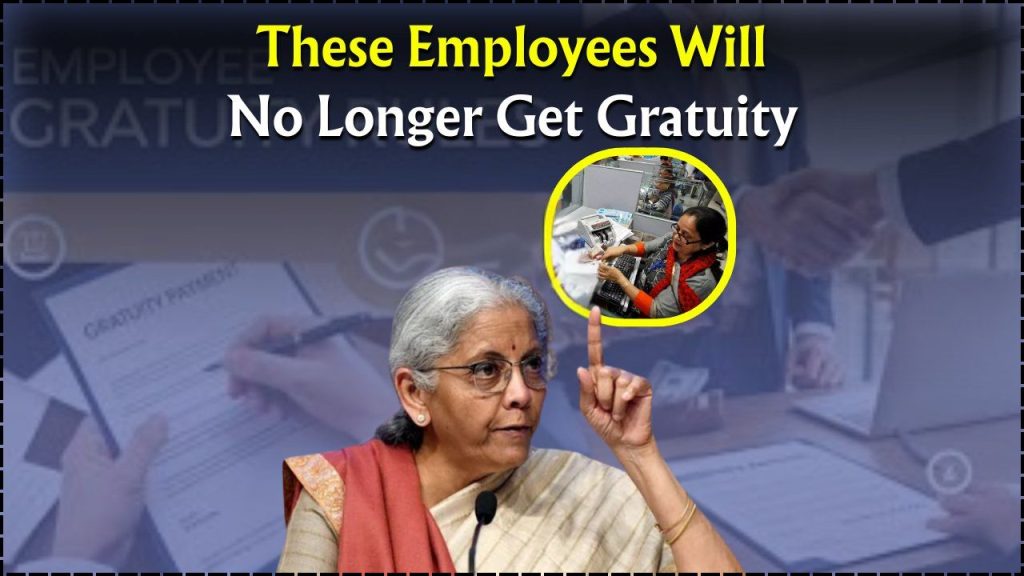
In a significant update that could affect millions of salaried workers in India, the central government has revised the gratuity rules under the Payment of Gratuity Act, 1972. While gratuity has traditionally been a key retirement or job-exit benefit for employees, the latest amendments are reshaping eligibility norms. As a result, several categories of workers, particularly those under temporary, contract, or non-standard employment models, may now find themselves excluded from this critical benefit.
This article covers the essential changes, who stands to lose or retain their gratuity, and how employees can safeguard their rights under the new law.
What is Gratuity and Why Is It Important?
Gratuity is a statutory lump-sum payment made by an employer to an employee as a token of appreciation for long-term service. It is governed by the Payment of Gratuity Act, 1972, and primarily aims to support employees financially post-retirement, resignation, or in case of disability or death.
Typically, gratuity becomes payable after completing five continuous years of service, with exceptions in case of death or disability. However, the 2025 amendment introduces nuanced definitions and fresh eligibility conditions to streamline claims and reduce employer liability.
Who Will Be Impacted by the New Rules?
The recent revisions are expected to significantly affect employees working in contractual, gig, seasonal, and outsourced roles. Here’s a list of affected employment types:
- Fixed-term contract employees with under 1 year of service
- Gig economy workers (e.g., freelancers, ride-share drivers)
- Seasonal and temporary workers
- Employees terminated for misconduct or fraud
- Probationary and newly hired employees
- Workers in startups and emerging sectors
These groups will now need to meet stricter criteria or may be excluded entirely from gratuity benefits.
Revised Gratuity Eligibility Criteria in 2025
The updated rules focus on redefining terms like continuous service, modifying minimum tenure conditions, and explicitly categorizing ineligible workers.
| Eligibility Criteria | Old Rule | New Rule (2025) |
|---|---|---|
| Minimum service duration | 5 years of continuous service | Eligible on a pro-rata basis |
| Fixed-term contract employees | Gratuity is partially allowed in some cases | Must complete 1 full year of service |
| Temporary/seasonal workers | Partial gratuity allowed | Mostly excluded |
| Employees on probation | Eligible after 5 years if retained | No gratuity unless confirmed and continuous |
| Misconduct termination | Gratuity after 5 years if conditions are met | Gratuity fully forfeited |
| Gig and freelance workers | Not clearly addressed | Explicitly excluded |
| Startups and probationary staff | Eligible if the company includes them in records | More restrictive clauses for new businesses |
| Outsourced employees (not on payroll) | Mostly ineligible unless directly on the company payroll | Eligible if the company includes them in its records |
Major Differences Between Old vs New Gratuity Rules
To help you visualize the contrast, here’s a comparative table explaining the key changes:
| Parameter | Old Gratuity Rules | New Gratuity Rules (2025) |
|---|---|---|
| Eligibility Start Point | Eligible if counted in the company records | 5 years with stricter conditions for certain roles |
| Fixed-Term Contracts | Pro-rata basis allowed | Now only eligible after completing 1 year |
| Gig Economy Workers | Not defined | Explicitly declared ineligible |
| Seasonal Workers | Could receive partial gratuity | Largely removed from eligibility |
| Termination for Misconduct | Partial forfeiture possible | Full forfeiture applicable |
| Probationary Employees | Counted after confirmation | Now excluded until regularization |
| Outsourced Employees | Eligible if counted in company records | Only eligible if directly on payroll |
Sectors Hit Hardest by the Gratuity Rule Change
Some industries are more reliant on flexible staffing than others. The rule change will therefore have a bigger impact on sectors employing temporary, contract, or gig-based workforces.
| Sector | Impact Summary |
|---|---|
| IT & Software Services | Developers/testers on fixed-term contracts may lose eligibility |
| BPO & Call Centers | Freelancers, ride-share drivers, and delivery partners now completely excluded |
| Gig Economy | Freelancers, ride-share drivers, and delivery partners are now completely excluded |
| Education Sector | Temporary teachers and staff may lose coverage |
| Manufacturing Units | Seasonal laborers in sugar, textile, or agro industries may be excluded |
| Startups & New Ventures | Employees under probation or flexible roles may not qualify |
Top 7 Employee Types Likely to Lose Gratuity Eligibility
Here is a snapshot of worker categories now most at risk:
| Employee Type | New Gratuity Status |
|---|---|
| Fixed-Term Workers (<1 year) | Not eligible |
| Gig Workers (Freelancers, etc.) | Excluded |
| Outsourced Workers (off payroll) | Excluded |
| Probationary Employees | Not eligible |
| Employees Fired for Misconduct | Gratuity forfeited |
| Seasonal/Temporary Workers | Largely ineligible |
| Startup Staff (<5 years tenure) | Likely ineligible under new norms |
How to Protect Your Gratuity Eligibility?
Despite the tightened rules, employees can still take proactive steps to safeguard their gratuity rights. Here’s how:
- Clarify employment status: Ensure your contract mentions permanent or long-term status.
- Keep employment records: Maintain offer letters, salary slips, and joining letters.
- Avoid frequent job changes: Breaks in service can reset the 5-year clock.
- Confirm inclusion in payroll: Particularly important for outsourced or agency staff.
- Consult HR or legal experts: Get clarity on your gratuity status before resigning.
- Avoid early exits: If nearing 5 years, consider staying to lock in eligibility.
Legal and Financial Implications
- Employers must now disclose gratuity terms clearly at the time of onboarding.
- Legal avenues are open for employees wrongly denied gratuity, provided they meet the criteria.
- Companies are advised to revise their HR manuals and employment contracts.
- Employees planning retirement must calculate gratuity under new formulas and timelines.
Why Employee Awareness is Critical?
With many employees unaware of these new changes, there’s a growing need for awareness. A lack of clarity can result in employees unknowingly losing out on what could be a significant retirement corpus.
If you are unsure about your gratuity status:
- Ask your HR department for written policy details.
- Consult the Labour Department or legal advisors.
- Refer to official updates from the Ministry of Labour and Employment on: https://labour.gov.in
Quick Answers
1. Are gig workers eligible for gratuity after the new rule change?
No, gig and freelance workers are explicitly excluded from gratuity eligibility.
2. Will fixed-term employees get gratuity now?
Only if they complete at least 1 year of service; earlier, they were eligible on a pro-rata basis.
3. What happens if an employee is terminated for misconduct?
Their gratuity will be forfeited under the revised rules.
4. Can a startup employee get gratuity after completing 5 years?
Yes, but eligibility depends on confirmation of regular employment and continuous service.
Final Words
The revamped gratuity rules mark a significant shift in India’s employment landscape. While aimed at reducing misuse and streamlining employer liabilities, the changes could deny many workers a financial benefit they previously counted on. Both employers and employees must now adapt by updating contracts, reviewing employment policies, and staying legally informed. As always, early awareness and documentation are the keys to protecting your future financial entitlements.

Katherine Johnson is a passionate writer with a keen interest in storytelling, content creation, and creative expression. She enjoys exploring diverse topics and crafting engaging narratives that captivate readers.



